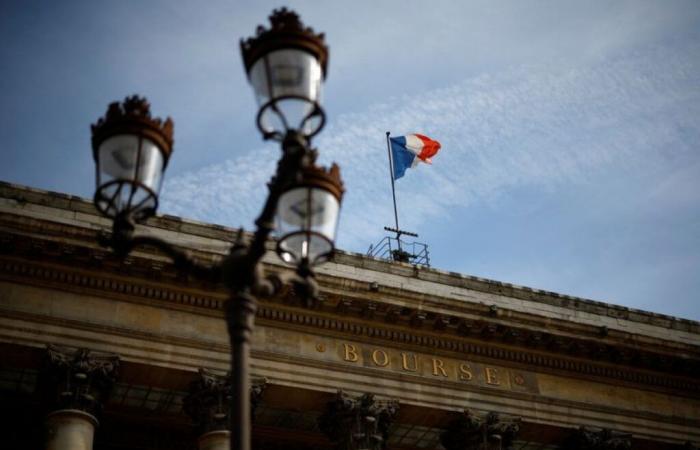A French national flag flies over the Palais Brongniart, the former Paris Stock Exchange
The main European stock markets are expected to fall on Tuesday at the opening before new indicators and after a denial from Donald Trump on possible customs duties less firm than expected.
Futures contracts suggest an opening down 0.42% for the Parisian CAC 40, 0.5% for the FTSE in London, 0.36% for the Dax in Frankfurt and 0.48% for the EuroStoxx 50.
The publication of new macroeconomic indicators will continue to shake up the session during a data-rich week.
Investors will scrutinize inflation in France and the euro zone, expected before the opening of the session and at the start of the session, in order to refine their outlook on further rate cuts from the European Central Bank (ECB ).
The markets are now forecasting an easing of just under 100 basis points in 2025 while the PMI economic indices for December published on Monday confirmed the sluggishness of the European economy.
A sharper decline in inflation would give the central bank more room to maneuver to lower rates, but uncertainties remain over cost dynamics.
It is particularly the data across the Atlantic which will liven up the week, with investors awaiting in particular the report on non-agricultural employment published on Friday.
The ISM services indicator and the JOLT job openings survey will give indications on the state of the American economy from this Tuesday.
Above all, President-elect Donald Trump's denial of possible customs tariffs that are less firm than expected and concentrated on certain sectors should remind the markets of the consequences of a second Trump presidency.
VALUES TO FOLLOW:
A WALL STREET
The New York Stock Exchange ended mixed on Monday, with the Dow Jones finishing narrowly in the red while the S&P and Nasdaq started the week on a positive note, buoyed by hopes of seeing President-elect Donald Trump show up. less aggressive than expected on the trade war front that he promised to undertake.
The Dow Jones index fell 0.06%, or 25.57 points, to 42,706.56 points.
The broader Standard & Poor's 500 gained 32.91 points, or 0.55% to 5,975.38 points.
The Nasdaq Composite advanced 243.30 points, or 1.24% to 19,864.981 points.
IN ASIA
On the Tokyo Stock Exchange, the Nikkei index ended up 1.97%, supported by semiconductor stocks which are benefiting from the performance of their American counterparts.
Hong Kong's stock market is trending lower after the United States added tech giant Tencent and others to a list of companies it says are working with the Chinese military.
The Hong Kong Hang Seng index declined by 1.86% while the Shanghai SSE Composite gained 0.09% and the CSI 300 0.21%.
RATE
Yields are rather stable ahead of several indicators expected during the session in the United States.
The ten-year Treasury yield declined 1 basis point to 4.6057%, while the two-year Treasury yield fell 0.8 bps to 4.262%.
CHANGES
The dollar is not moving forward on Tuesday, with markets wondering about the customs duty policies that Donald Trump wants to implement once he is inaugurated as President of the United States.
The dollar fell by 0.14% against a basket of reference currencies, the euro rose by 0.12% to $1.0402 and the pound sterling strengthened by 0.21% to $1.2543.
In Asia, the yen declined by 0.08% to 157.73 yen per dollar, the Australian dollar rose by 0.38% to 0.6267 dollars.
OIL
The barrel is rather stable on Tuesday with fears about global economic activity after gloomy data published in recent days.
Brent rose 0.01% to $76.31 per barrel, American light crude (West Texas Intermediate, WTI) weakened 0.08% to $73.5.
(Written by Bertrand De Meyer)






